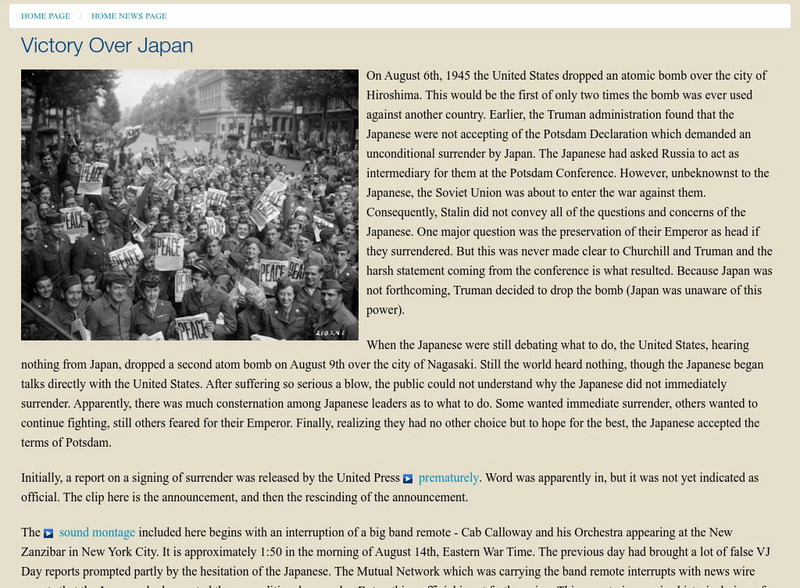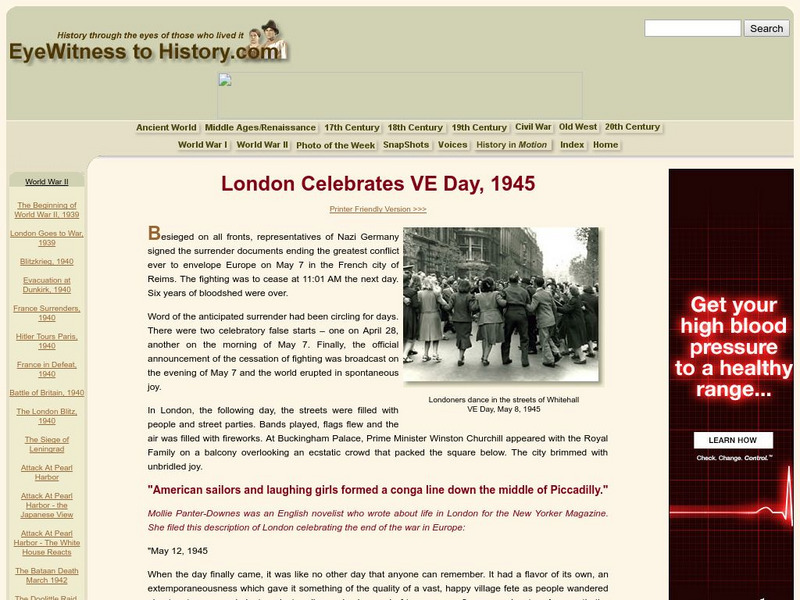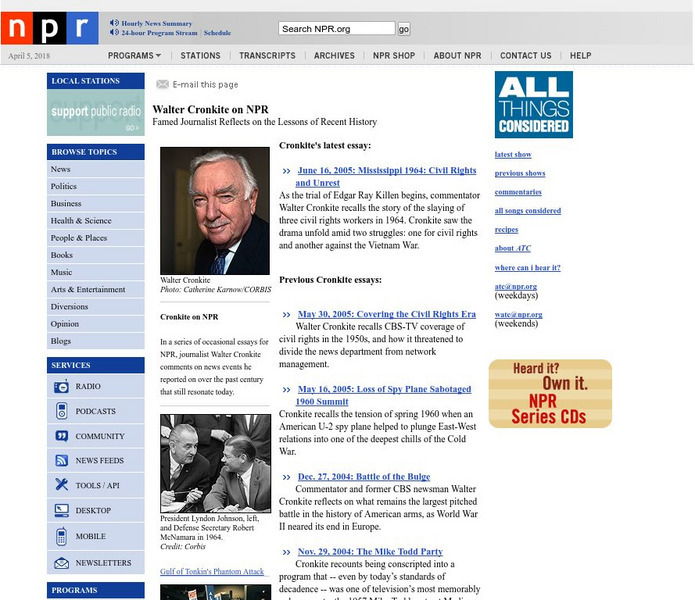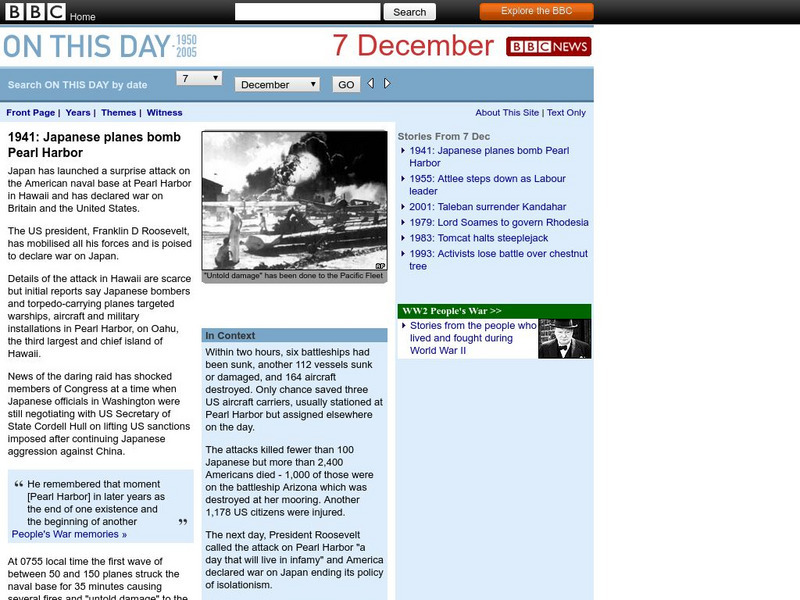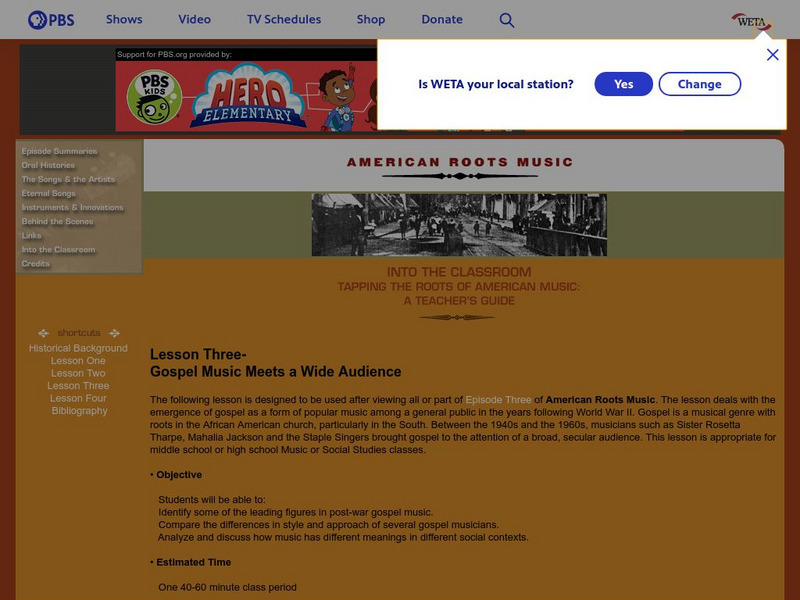Curated OER
Return to Vietnam: Healing on the Hill
Pupils view a film about soldiers returning to Vietnam years after the war. They discover the need of closure by the soldiers because the war was not won. They examine the results of the war and answer questions to complete the lesson.
Curated OER
History: Sherman's March to the Sea
Students analyze two sources. First, they will look at a letter written by Sherman to Grant as Sherman's army approached Savannah. Second, they will review the lyrics to the popular song of that period, Marching Through Georgia.
K12 Reader
What's the Purpose? FDR's Pearl Harbor Speech
FDR's December 7, 1941 address to the nation is the focus of a reading comprehension exercise that asks middle schoolers to read an excerpt from the Pearl Harbor speech and determine the president's purpose.
Curated OER
Using the Synoptic Code for the Prediction of Weather
Learners interpret the synoptic code. They construct a thermoscreen with an anemometer. Students identify different types of clouds and understand and read barometric pressure. Learners predict weather pattern as they apply to fronts.
Curated OER
Woodrow Wilson: Prophet of Peace
Students read and discuss various speeches by Woodrow Wilson, and write and present a brief radio address that will persuade the nation to return to world peace. Students analyze current events and discuss whether the world has upheld...
ReadWriteThink
Read Write Think: Oral Storytelling and Dramatization
Young scholars begin this lesson by discussing what makes a good, vivid story and creating a working checklist of the criteria for a good story. They explore background information about the Mercury Theatre production of the "War of the...
Library of Congress
Loc: Women Come to the Front
This resource discusses women as journalists, photographers, and broadcasters during World War II. Contains information about women as journalists in WWII. There is specific information about eight women journalists and examples of their...
US Department of State
America.gov: Edward R. Murrow [Pdf]
Highlights the life and career of broadcast journalist Edward R. Murrow. Examines his "This is London" reports during World War 11, the Senator McCarthy anti-Communist campaign in the 1950s, his critical treatment of migrant workers, and...
Other
Old Time Radio: Radio News: Victory in Japan Day
Original radio broadcast announcing the end of World War II after the surrender of Japan, and the jubilation that followed as crowds in cities across the United States celebrated in the streets.
American-Israeli Cooperative Enterprise
Jewish Virtual Library: The 1967 Six Day War
An archive of articles and documents relevant to the Six-Day War's causes, events, and results.
University of Houston
University of Houston: Engines of Our Ingenuity: No. 381: Civil War Submarine
A short discussion about the invention of the submarine and its use by both the Confederates and the Federals in the Civil War. This is a transcript of an accompanying radio broadcast.
Other
Vanderbilt University: Television News Archive
This archive from Vanderbilt University contains an "extensive and complete" collection of television news broadcasts. "The collection holds more than 30,000 individual network evening news broadcasts from the major U.S. national...
PBS
Pbs: Who Made America?: Innovators: Edwin Armstrong
This brilliant engineer advanced both AM and FM radio, turning them into viable broadcast technologies, and innovated military radio uses in two World Wars.
PBS
Pbs: American Roots Music
If teaching a unit about the history of popular music in America, this PBS web site supporting their four-part TV broadcast of a few years ago would make a great resource. Includes lesson plans and oral histories too.
University of Houston
University of Houston: Engines of Our Ingenuity: No. 1418: The Influence of War
Does war inevitably advance the invention of new technology? Read this explanation of why this commonly held belief may not be true, at least in the example of military aircraft. This is a transcript of a radio broadcast.
University of Houston
University of Houston: Engines of Our Ingenuity: No. 1373: Pittsburgh in 1816
Pittsburgh had a unique place in the nation after the War of 1812. It was an inland city and a rich source of iron. As such, it needed access to water for transport, and some of the first steamboats were used here. Read more about...
A&E Television
History.com: 8 Moments When Radio Helped Bring Americans Together
These are just a few of the historic radio broadcasts that seemed to have the whole nation listening. This article discusses eight of the most seminal moments in radio -- from KDKA's 's live nighttime Fireside Chats, the 'Fight of the...
National High Magnetic Field Laboratory
Magnet Academy: Timeline of Electricity and Magnetism: 1880 1889
Nikola Tesla and Thomas Edison duke it out over the best way to transmit electricity and Heinrich Hertz is the first person (unbeknownst to him) to broadcast and receive radio waves.
Ibis Communications
Eyewitness to History: London Celebrates Ve Day, 1945
Read the description of the celebrations in London on V-E Day in May, 1945. In addition, listen to the radio broadcast of the surrender of Germay.
NPR: National Public Radio
Npr: Walter Cronkite on Npr
Read the latest of Walter Cronkite's oral essays for NPR, in which he comments on events in recent history such as the Vietnam War, the U-2 crisis, and so on.
BBC
Bbc: 1941: Japanese Planes Bomb Pearl Harbor
On This Day is an archive of significant news stories broadcast by the BBC. Link takes you to its report of the bombing of Pearl Harbor broadcast on December 7, 1941. With in-context notes to aid understanding.
University of Houston
University of Houston: Engines of Our Ingenuity: No. 435: Hedy Lamarr, Inventor
Read about the remarkable actress Hedy Lamarr who, together with composer George Antheil, invented a technology that used frequency hopping to improve the effectiveness of Allied torpedoes during WWII. Their invention was not put into...
University of Houston
University of Houston: Engines of Our Ingenuity: No. 695: John Ericsson
A biography of John Ericsson, a man who invented in three countries over most of a century. He invented an early locomotive, a hot-air engine, screw propeller, and the Monitor, which was used in the Civil War. This is a transcript of an...
PBS
Pbs Teachers: Gospel Music Meets a Wide Audience (Lesson Plan)
A lesson that identifies some of the leading figures in post-World War II gospel music. Students compare the differences in style and approach of several gospel musicians and analyze how music has different meanings in different social...


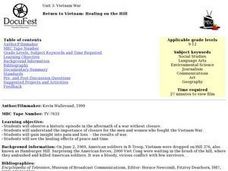
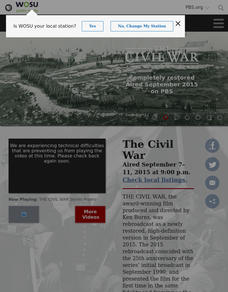





![America.gov: Edward R. Murrow [Pdf] Website America.gov: Edward R. Murrow [Pdf] Website](https://d15y2dacu3jp90.cloudfront.net/images/attachment_defaults/resource/large/FPO-knovation.png)
